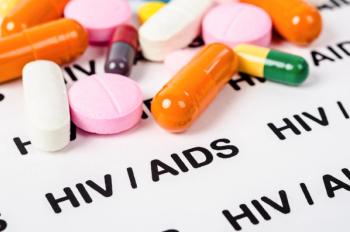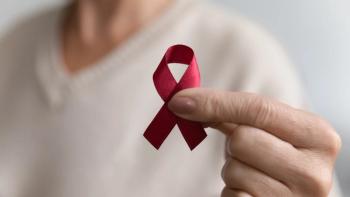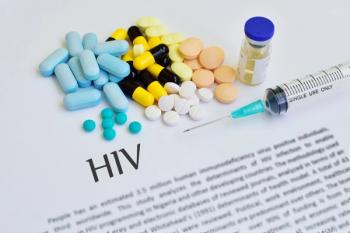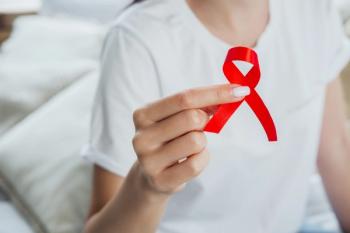
Exploring caregiver dependence and social determinants of health reveals critical barriers to HIV care for children, impacting treatment adherence and access, explains Priscilla Tsondai, MD, MPH.

Exploring caregiver dependence and social determinants of health reveals critical barriers to HIV care for children, impacting treatment adherence and access, explains Priscilla Tsondai, MD, MPH.


Lynae Darbes, PhD, discusses what her research results mean when it comes to implementation of self-testing and counselling for couples vulnerable for HIV.

An expert on the intersection of HIV and menopause, Bridgette J. Picou, LVN, ACLPN, The Well Project, explains the importance of overcoming siloed care for women living with HIV and going through menopause.

Lynae Darbes, PhD, discussed the findings of her study, which found that home-based visits helped to encourage the uptake of HIV testing.

In part 1 of this interview with Katrina Ortblad, ScD, MPH, she addressed bridging gaps in HIV care with pharmacy-based solutions.

Annie Antar, MD, PhD, spoke about how long viral clearance could be an indicator of long COVID, but more research would need to be done to confirm this.

Annie Antar, MD, PhD, discusses the association between the symptoms of long COVID and HIV status.

The Conference on Retroviruses and Opportunistic Infections 2025 (CROI) featured multiple sessions that focused on breaking research and treatments.

Experts share here what they take away from the Conference on Retroviruses and Opportunistic Infections (CROI) each year and why this meeting is so important in this space.

Priscilla Tsondai, MD, MPH, breaks down top care gaps as opportunities for care improvement.

The combination of doravirine plus islatravir was noninferior to bictegravir/emtricitabine/tenofovir alafenamide and oral antiretroviral therapy in patients who switched to doravirine plus islatravir.

Katrina Ortblad, ScD, MPH, Fred Hutch Cancer Center, collaborates with researchers from the Kenya Medical Research Institute to design and test novel delivery models for HIV services.

These abstracts highlight the compounded challenges people with HIV face.

Cabotegravir was found to prevent HIV acquisition as a monotherapy pre-exposure prophylaxis (PrEP) and to treat HIV as a combination antiretroviral therapy (ART) in its long-acting injectable form.

Lynae Darbes, PhD, presented research on the effectiveness of a home-based intervention for HIV prevention among couples living in Kenya.

New data from the MK-8591A-051 and MK-8591A-052 trials, both investigating the efficacy and safety of 100-mg doravirine and 0.25-mg islatravir as a once-daily 2-drug regimen for virologically suppressed people living with HIV-1, were presented today by Amy Colson, MD, MPH.

Patients in Washington, DC, and San Francisco had minimal early uptake and adherence to doxycycline postexposure prophylaxis (DoxyPEP) in studies presented at the Conference on Retroviruses and Opportunistic Infections 2025.

When patients switched to either fostemsavir or the combination of dolutegravir/lamivudine (DTG/3TC), suppression was maintained in most patients.

Bridgette J. Picou, LVN, ACLPN, presented research on the lived experiences of women living with HIV and going through menopause on Tuesday, during the mini symposia, “Hot Topic: Menopause and HIV.”

Long-term effects of COVID-19 include lingering symptoms that take months to improve, more severe illness for cancer survivors, and a higher risk of death after infection for people living in rural areas.

Early diagnosis and prompt antiretroviral therapy initiation are critical for children due to the rapid progression of HIV in infants, explains Priscilla Tsondai, MD, MPH, and unlike adults they require age-appropriate formulations, caregiver support, and strategies to ensure adherence.

To reduce care disparities and prevent them from exacerbating among people living with HIV who have long COVID, education and user-friendly diagnostic methods are key.

This research investigated averted hospitalizations in Oregon and Washington, which had greater than 75% uptake of at least 1 dose of an mRNA-based COVID vaccine.

Offering mailed self-testing for HIV encouraged patients to test themselves for HIV but requires methods of improving adherence to follow-up.

The Conference on Retroviruses and Opportunistic Infections 2025 opened with a session dedicated to informing attendees about the progress, and lack of progress, that has been made in the fight against the HIV pandemic given the current political climate.

This research on a T-cell–targeting vaccine in HIV has implications for future study design to incorporate consideration of age and years on antiretroviral therapy (ART) to evaluate the level of immune reconstitution.

One of the hot topics at this year's Conference on Retroviruses and Opportunistic Infections will be long COVID: potential causes, biomarkers, and the significance of viral rebound.

This year’s Conference on Retroviruses and Opportunistic Infections (CROI) features several sessions discussing prevention and treatment of viral infections like HIV and COVID-19.

259 Prospect Plains Rd, Bldg H
Cranbury, NJ 08512
© 2025 MJH Life Sciences®
All rights reserved.
